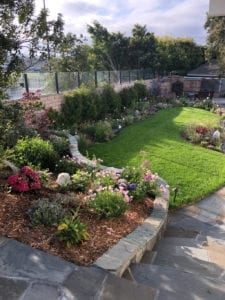A vibrant, green lawn is more than just a pleasing sight – it’s a dynamic ecosystem with a host of benefits that extend beyond mere aesthetics. In this exploration, we’ll uncover the multifaceted advantages of cultivating and nurturing grass in your lawn.

1. Environmental Stewardship
Grass is a natural ally in the fight against climate change. As it undergoes photosynthesis, it absorbs carbon dioxide and releases oxygen, acting as a potent carbon sink. Simultaneously, its robust root system helps combat soil erosion, contributing to the overall health of the environment.

2. Air Purification
Grass functions as a natural air purifier, capturing and filtering out pollutants and dust. Through the process of phytoremediation, it improves air quality, making it especially crucial in urban areas where air pollution is a prevalent concern.

3. Temperature Regulation
Lawns act as nature’s air conditioner. By absorbing sunlight and releasing moisture through transpiration, grass provides a cooling effect that helps alleviate the heat in urban environments. This makes a significant impact on urban climate control.
4. Biodiversity Support
Diverse lawns, with a mix of plant species, become thriving ecosystems. They provide habitat, food, and breeding grounds for insects, birds, and small mammals, contributing to local biodiversity and creating a balanced, resilient environment.
5. Recreational and Social Benefits
Beyond its ecological role, grass is an ideal surface for recreation. Whether it’s children playing, families gathering, or community events taking place, a well-maintained lawn serves as a safe, comfortable space. The visual appeal of greenery also contributes to positive mental health and fosters social interactions.

6. Soil Health
Grass roots are unsung heroes in maintaining soil health. They prevent compaction, promote water infiltration, and enhance nutrient cycling, creating a fertile environment for a thriving lawn. Healthy soil, in turn, supports the overall well-being of your outdoor space.

7. Erosion Control
Grass roots act as a natural barrier against soil erosion. This is crucial in preventing the loss of topsoil, particularly on slopes or in areas prone to runoff. Effective erosion control helps preserve landscapes and safeguards against environmental degradation.
8. Aesthetic Appeal
Last but certainly not least, a well-tended lawn enhances the visual charm of any space. The calming effect of a lush, green expanse contributes to an overall sense of well-being and harmony, making your lawn a visually pleasing and rejuvenating environment.

In recognizing the myriad benefits of grass in your home for your lawn, we acknowledge its pivotal role in environmental conservation, social engagement, and overall well-being. From purifying the air to fostering biodiversity and providing a space for recreation, grass is a dynamic force that deserves our attention and care. By understanding and appreciating the role of grass in our lives, we can make informed choices that not only beautify our surroundings but also contribute to a healthier, more sustainable planet.
To explore more ideas, visit Backyard Gardening: A Step-by-Step Approach.


